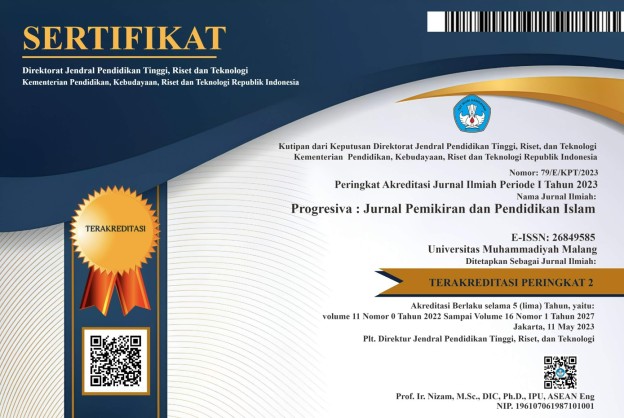Tariq Ramadan’s View on Western Muslims Identity: Between Nation and God’s Revelation
DOI:
https://doi.org/10.22219/progresiva.v11i01.20496Keywords:
Western Muslims, Nation, Identity, RamadanAbstract
The Western civilization is often considered to be more advanced than any other civilizations. Many people who think that western civilization is always in contradiction with Islamic values. Such this thing, it is written by Samuel P. Huntington that the West would have clash against Islam. The tragedy of 11 September 2001 was a historic event that made the world condemned this action. Some Muslim terrorists launched an attack on the West. Since then, the Western Countries are always alert to everything related to Islam. They think Islam is a threat to the survival of democracy and secularism. Tariq Ramadan Suggested that western Muslims must understand their identity as Western Muslims in order to be accepted in the West and tackle all negative views of Western people which are against them. They can have multiple identities depending on the situation they faced. There are four principles in their identity they are Faith, the understanding of the text and context, education (teaching) and participation. By participating without losing the first of those four principles, means Muslims able and should participate in realizing the integration of Western culture, with carrying on Islamic Values in order to be a significant contribution which equals Islamization.
Downloads
References
Bowen, J. R. (2010). Can Islam be French. New Jersey: Princeton University Press.
Eck, D. L. (2001). A New Religious America. New York: Harper Collins Publishers Inc.
Esposito, J. L. (2002). What everyone needs to know about Islam. Oxford: Oxford University Press.
Esposito, J. L. (2010). The Future of Islam. Oxford: Oxford University Press.
Fourest, C. (2008). Brother Tariq: The Doublespeak of Tariq Ramadan. New York: Encounter Book.
Freedman, J. (2004). Immigration and insecurity in France. Burlington: Ashgate Publishing Limited.
Gehman, H. (2002). September 11: The Terrorist Attack on America. In I. M. Abu-Rabi', & I. Markham, 11 September: Religious Perspectives on the Causes and Consequences (p. 9). Oxford: Oneworld Publications.
Hornby, A. S. (1995). Oxford Advanced Learner’s Dictionary of Current English. Oxford: Oxford University Press.
Huntington, S. P. (1997). Clash of civilizations and The Remarking of World Order. New Delhi: Penguin Book.
Husaini, A. (2005). Wajah Peradaban Barat Dari Hegemoni Kristen ke Dominasi Sekular-Liberal. Jakarta: Gema Insani.
Karstedt, S. (2003). Terrorism and “New Wars”. In B. Gokay, & R. Walker, 11 September 2001: War, Terror, and Judgement (p. 145). London: Frank Cass Publishers.
Khan, M. M. (2005). American Muslims and the Rediscovery of America’s Sacred Ground. In B. A. McGraw , & J. R. Formicola, Taking Religious Pluralism Seriously Spiritual Politics on America’s Sacred Ground (pp. 131-132). Texas: Baylor University Press.
Ramadan, T. (1999). To Be European Muslim. Leicester: The Islamic Foundation.
Ramadan, T. (2001). Islam, the West and the Challenges of modernity . Leicester: The Islamic Foundation.
Ramadan, T. (2004). Western Muslims and the Future of Islam. Oxford: Oxford University Press.
Ramadan, T. (2007, April 11). Muslim Minorities in Western Europe. Letures at Georgetown University. Georgetown, Washington D.C., United State of America: Georgetown University.
Ramadan, T. (2009). Radical Reform, Islamic Ethics and Liberation. New York: Oxford University Press.
Ramadan, T. (2010). The Quest for Meaning: Developing a Philosophy of Pluralism . London: Penguin Book.
Ramadan, T. (2010). What I Believe . Oxford: Oxford University Press.
Ramadan, T. (2017). Islam: The Essential. Great Britain: Pelican Books.
Spencer, R. (2002). Islam Unveiled: Disturbing Questions about the World’s Fastest-Growing Faith. San Francisco: Encounter Book.
Steinvorth, U. (2009). Rethinking the Western Understanding of the Self. Cambridge: Cambridge University Press.
Downloads
Published
How to Cite
Issue
Section
License
Copyright (c) 2022 Fardana Khirzul Haq, Muhammad Shulthoni, Fahrudin Mukhlis

This work is licensed under a Creative Commons Attribution-ShareAlike 4.0 International License.


















